
The world's fight for 'climate justice'
In March and April 2019, two devastating cyclones swept through Mozambique, one of the world's poorest countries. Hundreds of people were killed and millions more left in need of humanitarian support, such as access to safe water. The first storm, Cyclone Idai, was the second deadliest to ever hit the Southern Hemisphere. The second, Cyclone Kenneth, was the strongest to ever hit Africa.
This year, a major drought has led to the "complete disappearance" of food sources in Madagascar, according to the United Nation's World Food Programme. The "famine-like conditions", driven by climate change, are leaving people to eat only locusts and cactus leaves, it said in November.
Catastrophic events like these are among the ways millions of people around the world are already being impacted by climate change, many of whom have made little contribution to global emissions. From heat waves and floods to sea level rise and glacial melt, each year we learn more about the human influence on our climate – and witness more of its impacts.
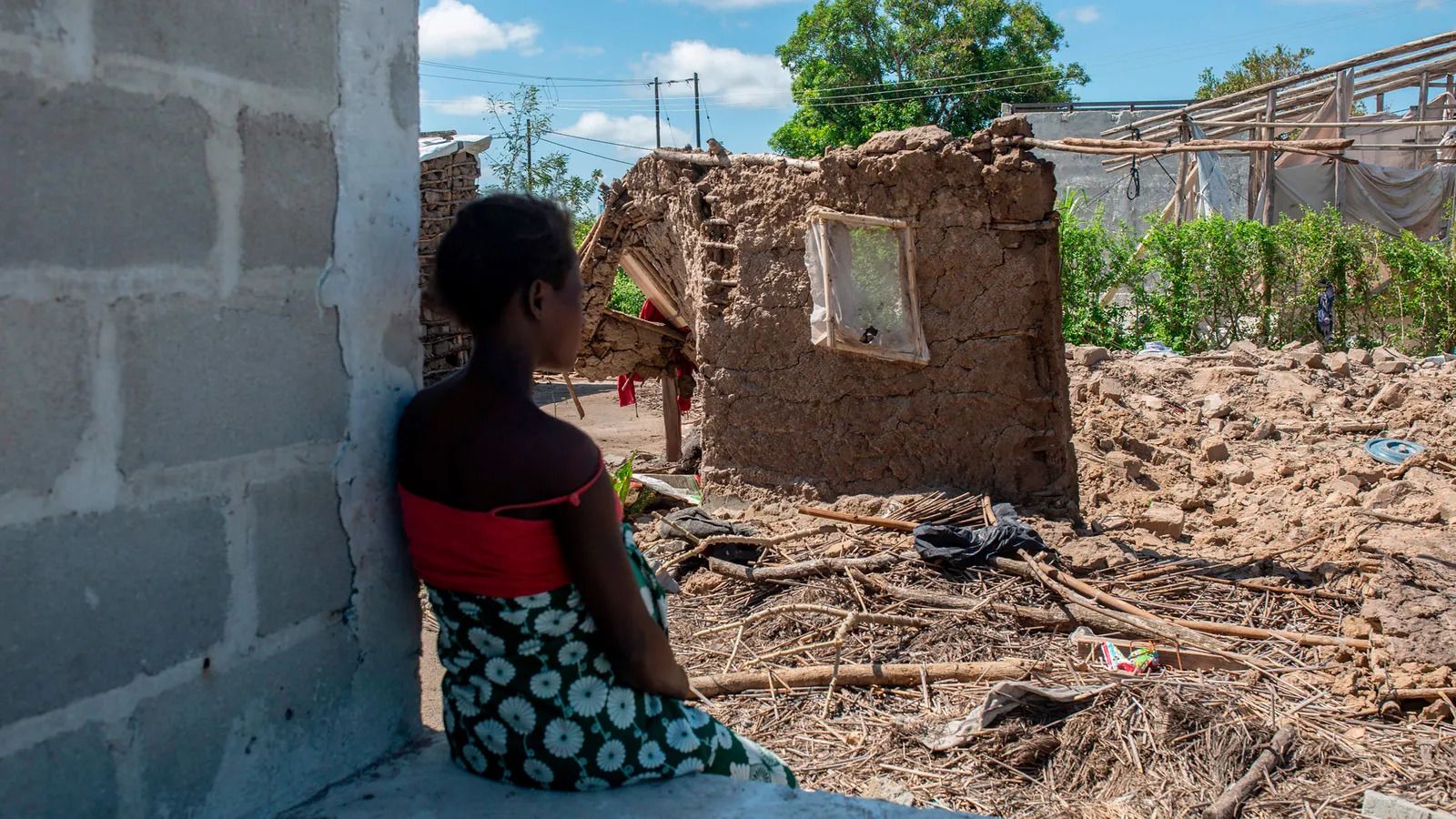 A woman observes the ruins of her house destroyed by cyclone Eloise in the Chinamaconde community of northern Mozambique
A woman observes the ruins of her house destroyed by cyclone Eloise in the Chinamaconde community of northern Mozambique
As the temperature of our planet creeps up, for many the fight to stop climate change is truly a matter of life and death. But exactly how it should be stopped, and who should take what action to stop it, is still far from settled. This matter is at the heart of the push to achieve international climate justice.
Those who are disproportionately impacted by climate change tend not to be those most responsible for causing it
Complex politics and overlap with other legacies such as colonialism and national debt in vulnerable countries has left this subject pushed to the sidelines. In the wake of a dramatic series of extreme weather events across the globe this year, and with the biggest UN climate conference since Paris in 2015 taking place in Glasgow, is it time for climate justice to be brought to the foreground of climate action?
What is international climate justice?
Climate justice means many things to many people, but at its core is the recognition that those who are disproportionately impacted by climate change tend not to be those most responsible for causing it. Climate change is not only an environmental problem: it interacts with social systems, privileges and embedded injustices, and affects people of different class, race, gender, geography and generation unequally. The climate solutions proposed by climate justice advocates aim to address long-standing systemic injustices.
"A very wealthy and very small minority of the world's countries and corporations have been the principal cause of climate change, while the adverse effects of the climate crisis fall first and foremost on the poorest majority," says Yeb Saño, executive director of Greenpeace Southeast Asia and previously a climate negotiator for the Philippines.
You cannot keep having your luxury emissions, and then point fingers at the person who's having emissions just to survive – Farhana Sultana
Climate justice is also heavily interconnected with historical injustices, says Trusha Reddy, head of energy and climate justice at the WoMin African Alliance. "It relates to how the climate crisis came about, who caused it, and so ultimately, who really needs to take the biggest amount of action."
Since the foundational UN climate convention was negotiated in the early 1990s, climate justice has been an important topic of discussion. The Paris Agreement mentions it directly, albeit in rather vague terms, simply recognising "the importance for some of the concept of 'climate justice'".
It's clear that global emissions need to be cut to avoid dangerous levels of climate change. But for many a bedrock of climate justice is the need for fairness in who cuts which emissions, taking into account both historical and present circumstances. "You cannot keep having your luxury emissions, and then point fingers at the person who's having emissions just to survive," says Farhana Sultana, an associate professor of geography at Syracuse University in New York who teaches an undergraduate course on climate justice. "That's just absolutely unfair and unjust."
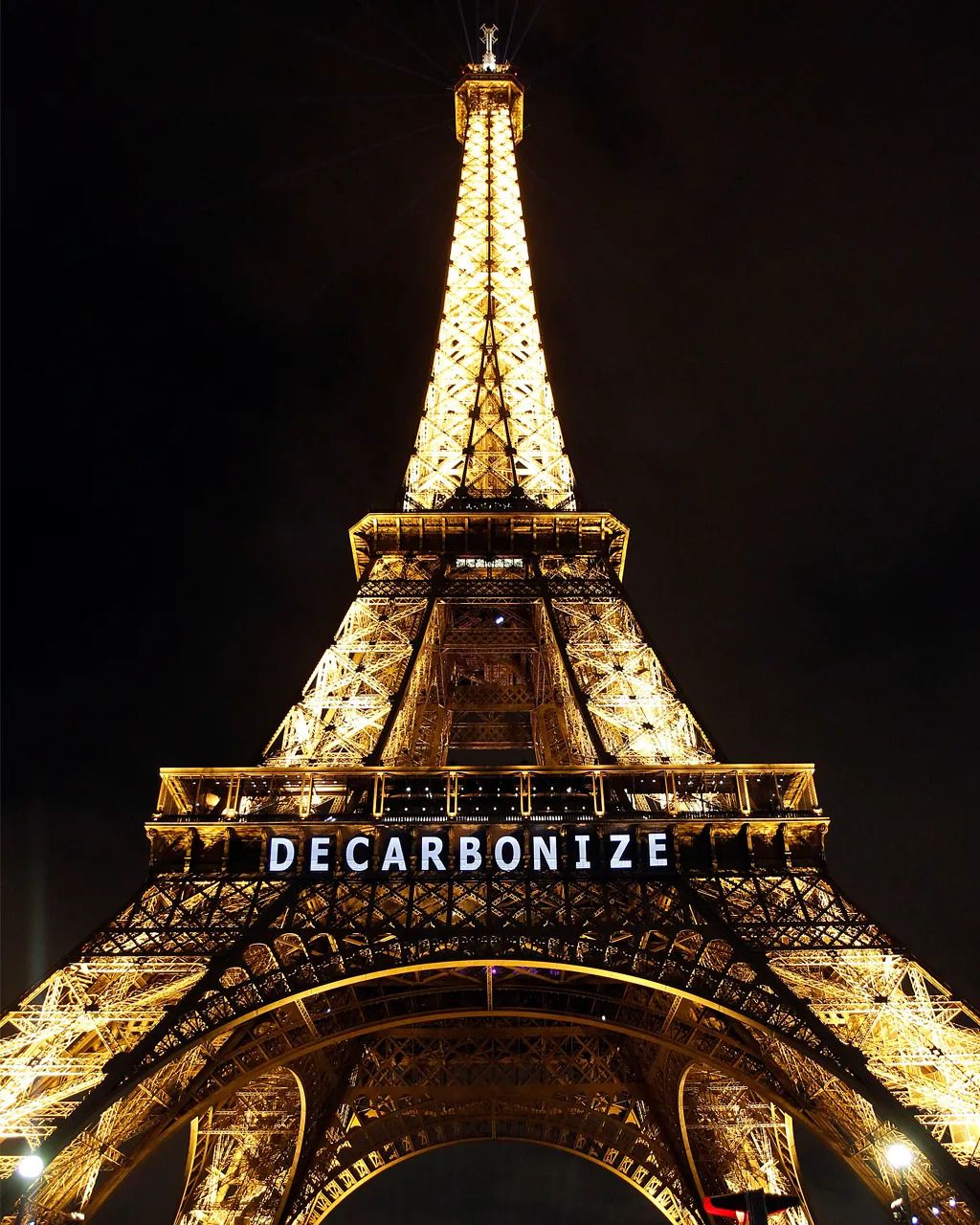 Rich nations have contributed the most to climate change, yet do not bear the brunt of the consequences
Rich nations have contributed the most to climate change, yet do not bear the brunt of the consequences
For example, just 0.09% of the world's total emissions are produced in Mozambique. On average, its 31 million citizens each have a carbon footprint around a quarter of someone in the UK. It is among the many vulnerable countries expected to bear the brunt of the impact of climate change, but can hardly be expected to dramatically cut its own emissions.
Much research has gone into exploring the most equitable way emissions cuts could be divided among countries, based on things like historical emissions, capacity to act and the current carbon footprint of citizens.
But the debate over who should take what action is a politically thorny one. The UN climate talks, which bring together many of the world's most powerful politicians, provide one of the world's main arenas for such discussions, but the push for a fairer distribution of action is often cast aside by richer countries.
This is a problem because country climate pledges are still far from where they need to be. Almost 30 years ago, nations agreed to stabilise greenhouse gas concentrations "at a level that would prevent dangerous anthropogenic interference with the climate system". Yet with 1.2C of warming reached so far, the world is already experiencing both extreme weather events linked to climate change and slow-onset climate impacts such as sea level rise, and the dangers increase with every year of further emissions.
The 2015 Paris Agreement set out a goal for countries to collectively hold global warming to "well below" 2C and "pursu[e] efforts" to limit it to 1.5C. Crucially, it also recognised that developed countries will have to reduce their emissions quicker than developing countries. "There is common responsibility for all countries, and for all of us in fact," says Saño. "But… those who have contributed more to this problem have bigger responsibilities than those who contributed less to the problem."
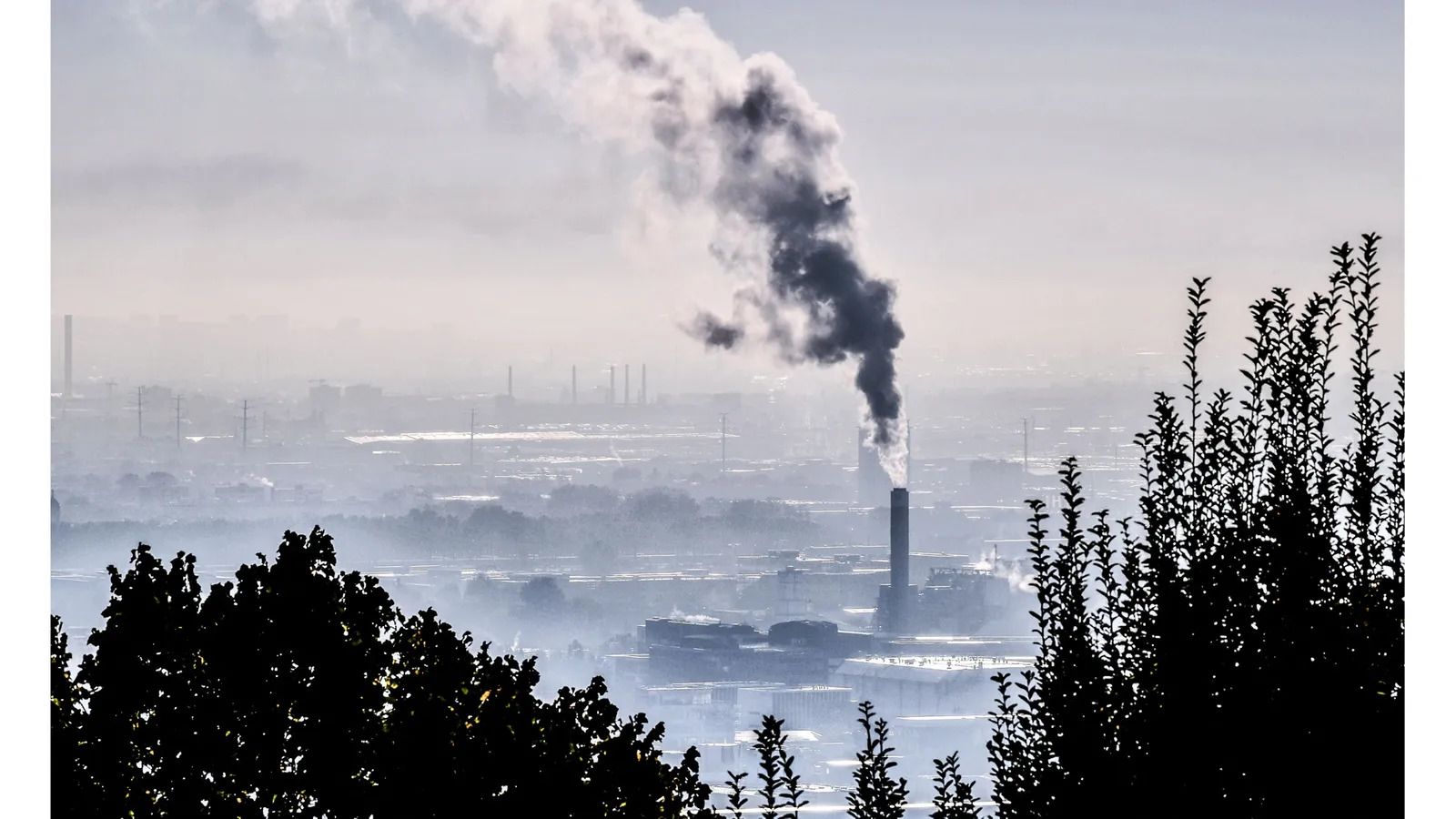 It is wrong to compare "luxury emissions" from high-carbon lifestyles in
rich countries with "survival emissions" in poorer ones, says Farhana
Sultana
It is wrong to compare "luxury emissions" from high-carbon lifestyles in
rich countries with "survival emissions" in poorer ones, says Farhana
Sultana
One issue, though, is that the Paris Agreement was designed so that countries would set their own voluntary climate pledges. And not all rich countries agree that they should be doing more.
Climate Action Tracker (CAT), which reviews climate pledges covering 80% of global emissions, reports that only one country it assesses is 1.5C-aligned: The Gambia. The majority of countries' pledges line up with a 2C, 3C or even 4C world, it says.
Many poorer countries haven't had the chance to amass wealth from burning huge amounts of fossil fuels, but are now being asked to give them up
"You are talking about a global crisis without setting up a target for each country based on their fair share," says Harjeet Singh, senior advisor on climate impacts at Climate Action Network International, a consortium of non-profits which pushes for progress at UN climate talks. "And here we are looking at a world which is going to be 3C warmer and beyond, where 1C is catastrophic for many communities and countries."
But while the Paris Agreement did not dish out binding climate targets based on equity and justice, its conciliatory approach has been credited for creating huge momentum for climate action across governments, businesses and citizens over the past six years. "A lot of people know I'm not a big fan of the Paris Agreement," says Saño. "But having been a climate negotiator for a good deal of my adult life, I understand the realpolitik that happens within multilateral negotiations. I would say that the Paris Agreement is basically the best we can arrive at as an international community."
There are many other aspects of international climate justice which intertwine with the push for individual countries to cut emissions. One big one is money. Many poorer countries haven't had the chance to amass wealth from burning huge amounts of fossil fuels, but are now being asked to give them up, an issue which has been acknowledged at the UN talks. Back in 2009, developing countries were promised $100bn (£73bn) a year every year from 2020 onwards to help them tackle climate change, a pledge which is sometimes referred to as the "grand bargain" of the Paris Agreement.
It is now clear that this pledge has not been met. The Organisation for Economic Co-operation and Development, which tracks this finance, put the amount at $79.6bn (£58bn) in 2019, and has said that it only expects the annual $100bn funding to be met in 2023. In June 2021, UN secretary general António Guterres criticised G7 countries for their failure to meet the $100bn pledge, noting "a certain level of mistrust" in relation to the goal.
But it's not just the total amount of climate finance which is an issue here. There are also concerns about whether this money is being distributed fairly. For example, 71% of climate finance in 2019 was distributed as loans rather than grants.
"This is criminal, you count loans as climate finance, which are going to come back to you with interest?" says Singh. "If the $100bn is not real, and you're including loans and guarantees and investments and everything into it, the reality is that the power of that $100bn to leverage trillions [more dollars] also goes down."
There are big concerns about the focus of this spending, which has been largely on measures to cut emissions rather than to help people adapt to climate change. The Paris Agreement said climate funding should achieve a "balance" between measures to cut emissions and projects that help people adapt to the impacts of climate change, but so far this has tipped far more towards emissions reductions. With climate change already significantly affecting people around the world, financial support to help people adapt to these impacts is another huge part of the justice conversation.
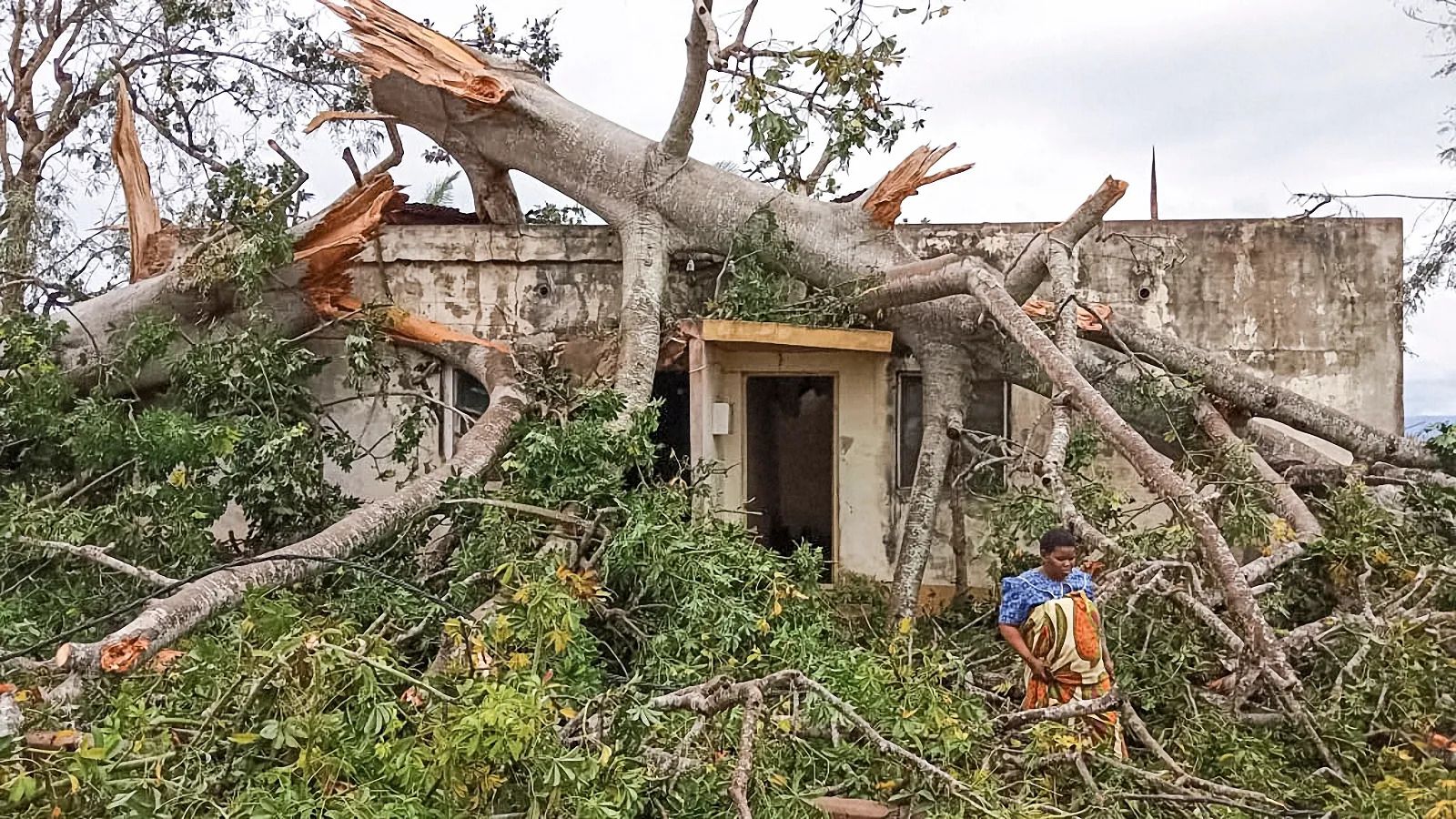 A woman in Macomia, northern Mozambique assesses the damage after a
mature baobab tree slammed into her home during Cyclone Kenneth in 2019
A woman in Macomia, northern Mozambique assesses the damage after a
mature baobab tree slammed into her home during Cyclone Kenneth in 2019
There is now a rising body of science linking climate change to events that are already happening today, such as extreme weather episodes and sea level rise. For example, while it is tricky to specifically attribute Mozambique's two 2019 cyclones to climate change, experts say the warming ocean surface means storms can intensify more quickly, and that flooding caused by tropical cyclones is amplified by rising sea levels. Countries need to build up resilience, but doing this requires money.
"We cannot just expect countries to keep trying to adapt and develop on their own," says Sultana. "Vulnerable countries for a long time have been diverting their meagre national resources on climate adaptation, risk reduction or disaster rehabilitation."
This mistrust on climate finance has become a major political issue at the UN climate talks in Glasgow, COP26. In his opening address, Gaston Browne, prime minister of Antigua and Barbuda and chair of the Alliance of Small Island States, criticised the failure to meet the climate finance pledge, arguing that G20 countries have meanwhile provided more than $3 trillion (£2.2tn) in support to the fossil fuel industry since the Paris Agreement was adopted. The lack of trust is also likely to impact discussions at the conference on a new, higher, climate finance target for 2025.
Many vulnerable countries are also asking for a new category of international finance to be delivered for the "loss and damage" from climate change, a term which refers to the inevitable consequences of climate change which can no longer be adapted to. "What 'loss and damage' recognises is that that's beyond adaptation," says Harpreet K Paul, a human rights lawyer currently undertaking a PhD in climate justice at the University of Warwick. "You've just lost that territory. You've just lost the ability to farm on a particular area that ancestrally your community would have done."
Loss and damage is mentioned in the Paris Agreement, but there has been a strong resistance from many developed countries to include it in regular negotiations, and especially to discuss specific finance to address it. "We are even fighting to secure a permanent agenda item [at the UN climate conferences] on loss and damage," says Singh. "It's not just about immediate response, we are talking about permanent relocation, we are talking about sea level rise and glacier melt. It's massive."
So far only one developed country has pledged funding for loss and damage: Scotland, which announced £1m ($1.4m) to help communities repair and rebuild from climate-related events such as flooding and wild fires. "Climate justice has to be at the heart of COP26," said First Minister Nicola Sturgeon when announcing the fund. While a small amount, the move was seen as highly symbolic.
But even if more money were transferred to help vulnerable countries with climate change, there are other deep-rooted financial inequalities between countries. Debt cancellation and other kinds of debt relief are increasingly considered by some as another crucial aspect of climate justice.
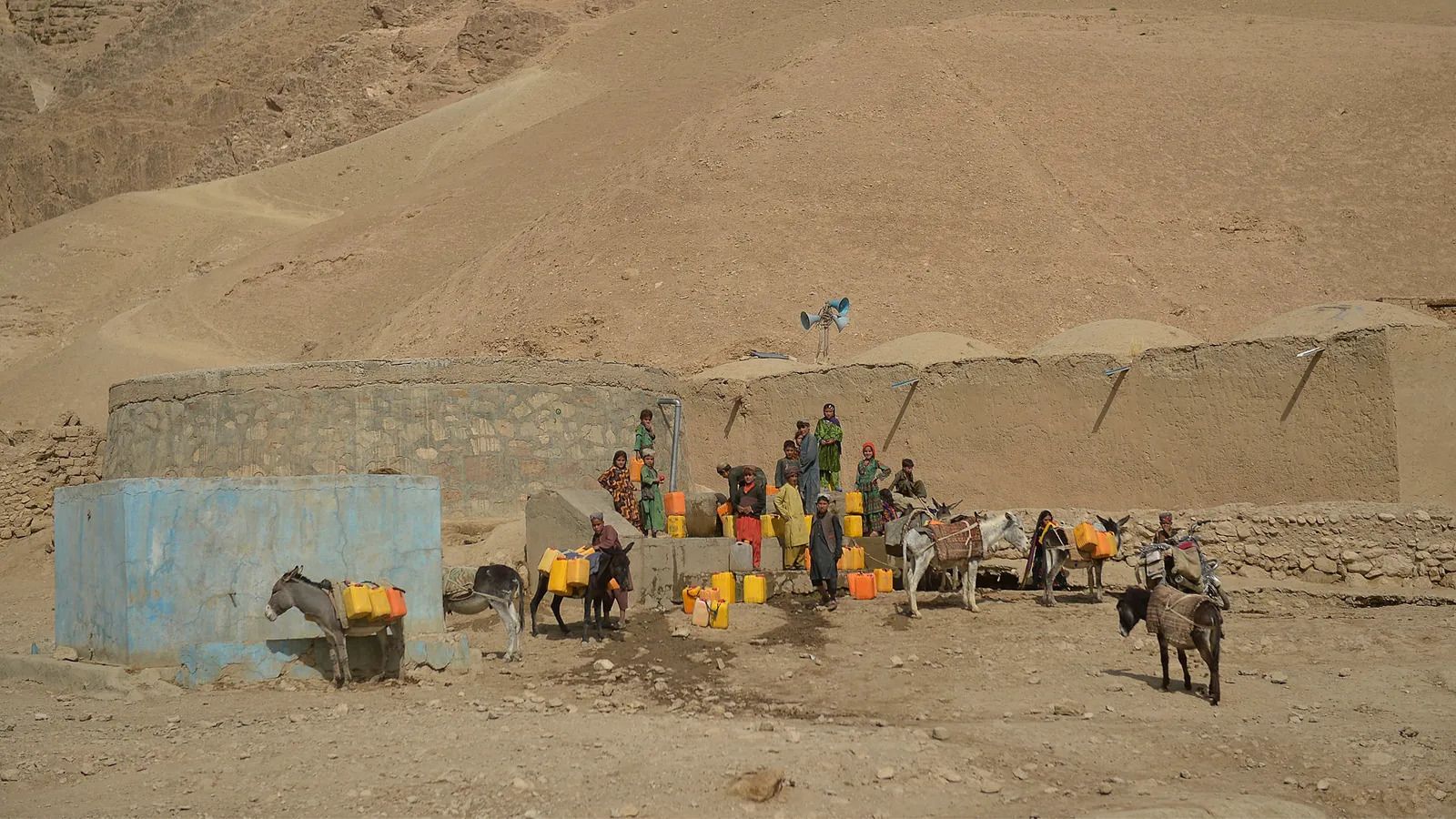 In poor nations, such as Afghanistan, extreme weather caused by climate change adds to insecurities from conflict
In poor nations, such as Afghanistan, extreme weather caused by climate change adds to insecurities from conflict
Many poor countries are embroiled in skyrocketing levels of debt linked with an international financial system they often had little hand in creating. This can severely impact their ability to act on climate change and protect themselves from its impacts.
Earlier this year, Browne called for "a permanent solution to the looming debt crisis", arguing that the debt of small states has risen to unsustainable levels "because of repeated borrowings to rebuild and recover from continuous debilitation by natural disasters, arising from climate change".
This month, the Jubilee Debt Campaign estimated that lower income countries spend five times more on external debt payments than dealing with climate change. In some countries, debt servicing is more than half of GDP, Singh links this directly with the ability of these countries to respond to the climate crisis. Paul agrees: "You're looking at countries in the Global South, and you're saying, yes, you need adaptation measures," she says. "But if at the same time, you've got requirements coming down from the provision of loans saying you need to engage in austerity, and that means reducing your social protection provision, you are not creating an economic equity that actually enables that."
You have countries that have built their infrastructure and resources and resilience on the basis of extracting wealth from previously colonised countries. You need to undo the structures that got us here – Harpreet K Paul
For example, when Mozambique was hit by the twin cyclones in 2019, it was forced to take a loan from the International Monetary Fund, adding to its already large national debt.
Paul suggests that debt is actually owed to Mozambique instead as reparations due to the ongoing legacies of colonialism. Mozambique has a colonial history, with Portuguese and British interests imposing forced labour, forced crop cultivation, high taxes, low wages and land sieges, she says. "You have countries that have built their infrastructure and resources and resilience on the basis of extracting wealth from previously colonised countries. You need to undo the structures that got us here."
It's a view not often spotlighted by big players at the UN climate talks. But examining such legacies are crucial to many climate justice conversations. Sultana agrees that today's trade policies and the way goods and services are transferred between countries still display colonial imbalances and power relations.
Resource extraction often happens in impoverished countries at cheap costs, which benefits already wealthy former colonisers or present-day imperial nation states, and then, "further impoverishes and in-debts the countries of the global south, who are also facing the double whammy of disproportionate climate related hazards and disasters," she says. "[Climate justice] also gives us an opportunity to redress those colonial racial class-based harms that have occurred over time".
Saño says he has been inspired by how the Black Lives Matter movement has unearthed centuries of injustice. "It is the same with climate justice," he says. "This is not about any simple conversation on who reduces emissions today. We need to reflect on the harsh and inconvenient reality that many poor countries are poor because of colonisation, because of the raw materials and natural resources being taken from these countries and used by industrialised nations."
Justice, in many ways, has a timetable, adds Saño: "if you delay it, you deny it". Ultimately, climate justice is about respect for all humans, he adds. "That is what we're asking for. When we reach a point when every human being lives with a life of dignity, then we would have achieved climate justice."











